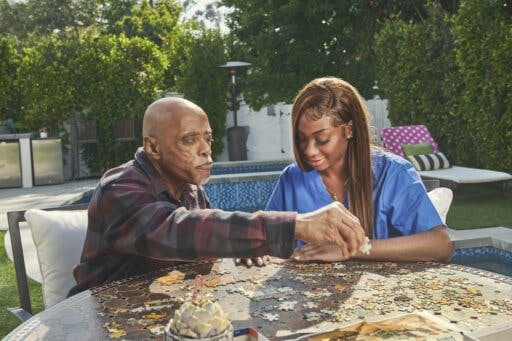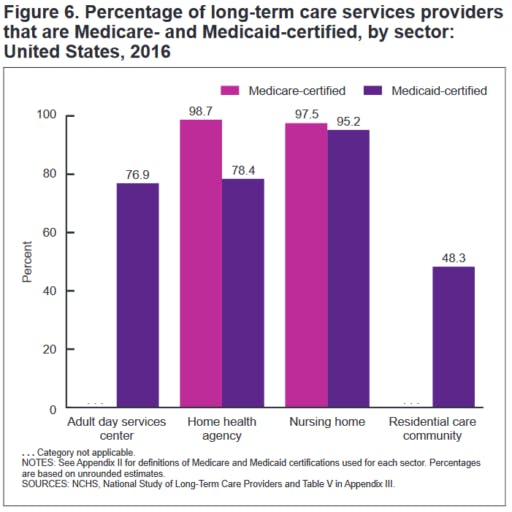What Are the Different Types of Home Care?
Over the last several decades, nursing home numbers have remained flat. There’s a reason for that: more seniors are searching for alternatives that …

Over the last several decades, nursing home numbers have remained flat. There’s a reason for that: more seniors are searching for alternatives that allow them to retain their independence and age in place at home.
Traditionally, aging family members were placed in a skilled nursing facility because they could no longer take care of themselves. These days, families and seniors have multiple options, thanks to a variety of home care options. Hiring an in-home caregiver is essential because it allows them to retain their independence through the activities of daily living (ADLs) and age gracefully.
However, there are different types of home-based care. When looking for care for a loved one, you need to know what options are available so you can develop a plan that helps seniors live their best life.
What Is Home Care?
Home care is when a caregiver serves a person in need in the comfort of their home. Responsibilities vary based on the patient’s needs—for example, some individuals need help getting around while others need support with personal care activities like bathing and dressing.
Still, others may require medical expertise that includes not just medication reminders but also administering the medication. This is often the case in post-op situations or situations where the individual has a chronic disease or condition they’re dealing with, such as diabetes or kidney issues.
Regardless of the exact home care plan you formulate or the services you choose, all home care is designed to make life as easy as possible for your loved ones.
Seniors using home care instead of going to a nursing home report a better quality of life. They also report 50% fewer doctor’s visits annually. While the term home care refers to any type of care offered at home, there are distinct types you can choose from. Which type of home care your senior wants and needs depends on their situation.
Different Types of Home Care
There are three main types of in-home care services. Two involve medical care, and the other is non-medical. Nursing care and home health care are both types of medical-based home care. Non-medical senior care is commonly known as home care and includes a variety of caregiving functions, including personal care and companionship, transportation and housekeeping.
For seniors, non-medical home care is like having a trusted family member helping them through the activities of daily living and “instrumental” activities of daily living (IADLs). These are essential but functional needs like help with paying bills, driving around, getting groceries, and more.
Non-medical home care focuses on meeting the lifestyle needs of seniors. It enables older adults to age in place instead of going to a nursing home or senior living center.
Meanwhile, nursing care and home health differ from non-medical home care in that they address the medical needs of chronic illness, disability, and medical recovery. Let’s take a look at the details of the different types of home care.
Nursing Care

Private duty nursing care is necessary for individuals who need medical attention because of an injury or illness. This kind of care provides medical services for those who are well enough to leave the hospital but not well enough to be entirely on their own. If your loved one requires medical attention, then nursing care is essential.
A private nurse might have several possible responsibilities that include fulfilling the doctor’s orders and providing updates for the doctor about a patient’s condition. The nurse’s services might include:
Care for diseases and conditions
Ventilator administration
Monitoring vital signs
Administer medications
Wound care
Since nursing care is medical in nature, there are associated costs. However, your insurance carrier should be able to cover some or most of the cost, depending on your coverage terms.
As a senior, you may also be eligible to use Medicare for nursing home care. Or, if you become injured while working in unsafe conditions, workers’ compensation might cover your medical expenses.
For at-home nursing care, the length and frequency of care depend on a variety of factors as well. You or your family member’s doctor will determine how much nursing care is required. For example, some people may only require a nurse to check in several times a week. More severe cases can require 24-hour care.
Home Health Care Providers
Home health care is another medical care option. It includes medical assistance, offered by home health agencies, for patients at home recovering from an illness or injury.
For home health care services, a home health aide fulfills a doctor’s orders and prescriptions. Additionally, private doctors and specialists set up appointments to provide care.
Home health aides deliver medical services that differ from nursing care. Their services include:
Physical therapy
Occupational therapy
Speech-language pathology
Medical social work
Similar to nursing care, home health care costs depend on the type of treatment you receive. Your payment choices are similar as well, as either insurance and Medicare and Medicaid are good options. If you’re not eligible for this, you could also set up and use an HSA (health spending account) for long-term care.
One of the most significant differences between nursing care and home health care is the length of the care. Home health care is not 24-hour care. The nurses or medical specialists are in your home for no more than a few hours a day.
Home Care

Home care is a non-medical treatment plan. Non-medical professionals assist your loved one with activities for daily living within the confines of their home. They help with responsibilities around the house.
Their purpose is to make life easier for the individual. Non-medical home care includes transportation, medication reminders, light housekeeping, personal care, meal preparation, companionship, and respite care.
These are some of the essential in-home care services an in-home caregiver provides:
Personal care
Personal care focuses on helping your loved one maintain personal hygiene. As people age, it’s common for them to feel insecure and frustrated about things they can no longer do on their own. Personal care helps you feel comfortable in your skin. Whether it’s using the restroom or navigating around your home, a professional caregiver can help.
Light housekeeping
One of the most challenging things to stay on top of as people age is housekeeping. Light housekeeping services include taking the trash out, assisting with laundry, maintaining a clean environment, and helping with the organization of the home.
Meal preparation
Besides rest, proper nutrition is necessary for a long and healthy life. With meal prep services, caregivers help with grocery shopping, general kitchen safety, cooking, and cleaning up after a meal. A trained caregiver can prepare enough food for a few days so your loved one will have plenty to eat. Especially in the golden years, proper nutrition is critical to maintaining physical and cognitive fitness.
Medication reminders
Even though home care is not medical care, caregivers can help you remember to take your medication. Caregivers can work with medical care providers to ensure your loved one takes the recommended doses and does not forget any medicine. Caregivers are crucial in keeping your family members safe by monitoring any medications’ adverse side effects or complications, so you will always have peace of mind.
Companionship
When left alone for long periods (days and weeks), seniors might suffer from depression and feelings of isolation. Companionship services help patients to continue socializing and engaging in thoughtful and meaningful interactions that will boost their self-esteem and improve their mood.
Respite care
Many caregivers know what it is like to be a family caregiver. Respite care services allow family and primary caregivers to take a much-needed and well-deserved break from caring for their loved ones.
Conclusion
Figuring out the correct type of care does not have to be complicated. Once you know whether or not you need medical care for your loved one, you can easily decide the next step. And with flexible care services, you can also combine at-home medical and home care services.
The goal is to ensure your family has everything you need to thrive. For in-home care services available around the clock, contact 24 Hour Home Care. We can help you and your loved one find the stability and comfort you need.

